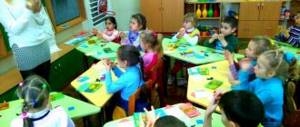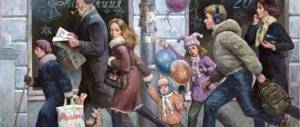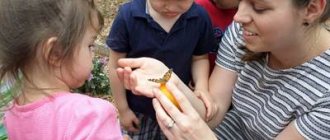Kindergarten No. 92
“We are all different, but we are together”
On the blue planet, On planet Earth Every child has their own rights.
Dear parents!
Today we will talk about children's rights. Namely, let’s remember what rights a child has.
Since ancient times, humanity has understood that life begins in childhood. Many thinkers raised the problem of protecting childhood in their works. With the advent of the 21st century, realizing that children are the most precious thing in any society, the whole world has faced the problem of how to protect the rights of the child.
Today's children are the citizens of tomorrow's world, and their survival, protection and upbringing are imperative for the development of humanity in the future. Ensuring the rights of the child today is the implementation of the Universal Declaration of Human Rights tomorrow. It will not be fulfilled if today's generation of people is not raised to respect children's rights. Protecting children's rights is a matter for the entire society.
Children, like adults, have their own rights and responsibilities.
Rights are norms and rules established and protected by the state. The state establishes for its citizens the opportunity to enjoy various benefits. For example, receive free medical care, education, and rest.
Responsibilities are a certain range of actions that must be performed. For a child, this is, for example, the obligation to respect and honor adults.
There are documents that establish the rights of the child in our country. These are the UN Convention on the Rights of the Child and the Legislation of the Russian Federation. For example, Article 6 of the UN Convention states that “every child has the right to life,” and Article 16 states that “no child shall be subject to arbitrary or unlawful interference with his or her right to privacy or family life.” , inviolability of the home." Article 31 talks about the “right of the child to rest and leisure”.
The UN Convention protects the rights of children around the world. This is the main international document for children, signed by the people of our planet.
Every child has the right to a name. As soon as a child is born, he is given a first and last name. People of different nationalities have their own unique names. A name distinguishes a person from other people.
Each name has its own meaning. For example, Natalia the dear, Victor the winner, Sofia the wise. Ask your parents to tell you what your name means, why they gave it to you, and who suggested calling you that. A surname can also mean something. For example, the Russian surname Ivanov means that the first person to bear it was the son of Ivan. And the surname Kuznetsov means that the first person to wear it was the son of a blacksmith.
Citizens of our country, in addition to their last name and first name, also have a patronymic. The patronymic is given to each child by his father.
The child's last name, first name and patronymic are recorded in a document called a birth certificate. The same document contains the last names, first names and patronymics of the child’s parents.
Every child has the right to life and development. The state, parents, teachers, doctors, police and many other people take care of protecting the life of a child. No one can ever take the life of a child.
Adults have come up with special rules of behavior for all people on Earth on the street, at home, on the water, in a car. Even in kindergarten, children are introduced to a subject called life safety (life safety). If children follow the rules of life safety, nothing bad will ever happen to them.
Every child has the right to know his parents, the right to be cared for by them. Parents are legally responsible for the child, manage and guide the child in the exercise of the rights recognized by the UN Convention. Parents take care of the child, and the child treats them with respect and shows respect.
Every child has the right to live in a prosperous, friendly family. It’s good when a child is surrounded by several generations of family: mom and dad, grandparents, great-grandparents.
Every child has the right to housing and its inviolability. No one is allowed to break into your home and deprive you of your home. You should feel completely safe at home.
Try to remember and know your home address and telephone number.
Remember that there are other people living in the house with you. You must treat them with respect and follow the rules of the house.
Health is the main value of a person. Every child has the right to health care and medical care.
Even before the birth of a child, adults begin to take care of his health and prepare for his birth. From the first days of a child’s life, parents, grandparents, medical workers in kindergartens and children’s clinics, and teachers in kindergartens take care of his health. Adults make sure that the child follows a daily routine, eats right, eats healthy foods, receives vitamins, walks a lot, exercises, exercises and sports, plays outdoor and sports games.
In order to protect a child from infectious diseases, he is given vaccinations.
For examination and treatment of children, there are children's clinics, medical centers and children's hospitals.
Every child should know how to call an ambulance for themselves and their loved ones. Remember the phone number: 03. Emergency call 112.
Every child has the right to education. A child must have the opportunity to learn in order to develop his talents, mental and physical abilities.
In our country there is a network of kindergartens where boys and girls of preschool age play, draw, dance and sing, and play sports. Teachers help children become attentive, smart, independent, active, and prepare for school.
Every child has the right to rest and leisure, the right to participate in games and recreational activities appropriate to his age, to freely participate in cultural life and to engage in the arts.
Children's camps and sanatoriums have been created in Russia for the recreation and health improvement of children. In the city of Kursk there are children's theaters, circuses, children's libraries, attractions in parks and entertainment complexes.
In our kindergarten, children can practice singing and dancing, drawing and making crafts from natural materials.
Every child has the right to protection from abduction. The state must take the necessary measures to suppress the sale and smuggling of children for any purpose.
Children should know that they should never give in to the persuasion of unfamiliar adults to go for a walk with them, ride in a car, or go buy toys.
Every child has the right to use their native culture and native language. The Russian Federation is a multinational state in which many different peoples live: Russians, Tatars, Jews, Chuvash, Ossetians, Chukchi, Khanty and others. In our country, we respect the culture of different peoples and instill in every child pride in their people, their culture, their language. Children of different nationalities are taught to be friends, visit each other, play and study together.
Every child has the right to a citizenship. From birth he is a citizen of the state in which he lives.
Every child in our country is a Russian, a citizen of Russia, and has the right to care and protection from the state. This right is confirmed by the first document of each child - a birth certificate.
When a child turns fourteen years old, he receives the following document - a passport of a Russian citizen. The passport contains the person’s first, middle and last names, his date of birth, and address. The Russian coat of arms is depicted on the cover of the passport.
Every citizen is obliged to love his Motherland and participate in the life of his country, to stand up for its defense if it is in danger, to be honest, fair, brave, and courageous.
So, all people living on Earth are different, but they are all equal, they all have the same rights to life, name, to their home. All people on the planet should be friends with each other and live in peace!
Now you, dear parents, have remembered the rights of the child. Love your children - parental love is one of the greatest human values.
The child’s right to creative development
According to the Russian Law “On Education”, any child can apply for an individual approach in kindergarten, as well as the identification of his talents and their development. To do this, educators are required to carry out creative activities (drawing, modeling), which cannot be monotonous, and there must also be no discrimination based on the level of ability on the part of the teacher.
Important! The lack of developmental creative activities is a direct violation of the rights of a preschool child.
Examples of violation of rights in preschool educational institutions
There are several fairly typical situations of violation of a child’s rights when entering kindergarten. For example:
- The preschool educational institution denies the child the opportunity to take a vacant place due to the lack of necessary vaccinations . Parents have the right to make independent decisions regarding the health of their child, in particular, his vaccination;
- The preschool educational institution refuses admission to the child due to lack of registration at the place of residence . A child can enter kindergarten even on the basis of a rental agreement for an apartment in the area of the preschool educational institution. They do not have the right to deny him the opportunity to attend a child care facility.
We also note possible situations of violation of rights in preschool educational institutions:
- A teacher's rude, violent attitude towards a child, as well as sarcasm or shouting in his direction, is one of the most important violations of the rights of a small citizen. The teacher must be prepared for different behavior of the child, must be prepared and have the desire to work with such a child;
- insufficient garden equipment or non-compliance of food with state standards . The kindergarten must provide items that the child will need to meet his everyday needs. The premises must be clean and safe;
- The teacher's indifference to children is unacceptable . Children must be supervised both during the walk and in the group of the child care facility.
The state protects the life and health of children in the kindergarten
The state provides guarantees for the life and health of preschool pupils. This means that the garden must be designed and equipped taking into account safety standards.
The institution must have a medical office, where there is a medical worker who can provide first aid to the baby, as well as help cope with the first signs of illness. In addition, he can contact his parents if there is a reason, or call an ambulance.
If there is no such opportunity in the garden, there is a gross violation. In this case, the child’s right to health and life is neglected.
Educators are responsible for the safety of the child within the time he is in the kindergarten. If parents wish to pick up a child outside the established regime, this must be stipulated in the agreement with the preschool educational institution.
The right to games and proper rest within the preschool educational institution
In kindergartens, lessons are often held on the development of fine motor skills, where children do something with their own hands, and in other classes they learn letters, but a change in developmental activities and games is mandatory. In the process of games, kids also learn and prepare for adult life, acting out various situations and episodes of the life of adults.
There are federal educational standards that determine leisure options for children in kindergarten. At the same time, the teacher is not a person who simply observes - he implements and accompanies new games that develop children and at the same time allow them to relax.
“Studying” the phone or idle conversations with other staff shows the teacher as an employee indifferent to his duties. It often happens that in groups a TV is installed and children watch cartoons all day long. Of course, the teacher in this way relieves himself of the burden, but he also violates the preschooler’s rights to full-fledged active games.
For rest, the child should be provided with his own crib where he will sleep. This should be a comfortable place for him.




